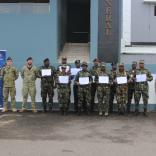Mozambique: Police officers suspended at Incoluane checkpoint - AIM report
Taipo trial: Accused admits forging documents – AIM report

File photo: Domingo
The National Directorate of Migrant Labour (DTM), in the Mozambican Labour Ministry, sent to the Central Office for the Fight against Corruption (GCCC) forged invoices and receipts to justify the disappearance of 17 million meticais (about 266,000 US dollars at the current exchange rate), from the fees collected from employers for the hiring of foreign labour.
Jose Monjane, former head of the DTM finance department, on Wednesday told the Maputo City Court that this falsification of documents began in 2017 when the GCCC launched its investigation into the DTM. It gave the DTM a deadline for providing documents to justify expenditure regarded as dubious.
Monjane is one of 11 people, of whom the most prominent is former Labour Minister Helena Taipo, who face charges of stealing 113 million meticais of state funds in the 2014-2016 period. He was testifying before the court for the third consecutive day.
Knowing they were under investigation, the DTM managers tried to disguise the embezzlement of funds by forging documents. Thus, the DTM asked the company Vetagres Agro-pecuária to issue invoices to the value of 14 million meticais, which the DTM had supposedly paid for the supply of agricultural inputs for projects that would allow migrants returning from the South African mines to become reinserted into Mozambican society.
Other fictitious projects involved the company Bela Eventos. Documentation from this company supposedly proved that the DTM had spent three million meticais on legitimate events.
Monjane confessed that he had done to the head office of Vetagres Agro-pecuária, in Magude district, about 90 kilometres north of Maputo, to negotiate a fake contract with its owner, the co-accused Hermenegildo Nhatave. The latter agreed to provide the contract and to fake invoices and receipts to the value of 14 million meticais. In exchange, Monjane paid him 375,000 meticais.
It was much the same story with Bela Eventos: Monjane needed this company to provide him with justification for illicit expenditure of three million meticais, in the hope that this would throw the GCCC off the trail.
Monjane admitted that he had negotiated directly with these companies, but said he had done so on the instructions of his superiors, including Helena Taipo and the National Director of Migrant Labour, Anastácia Zitha.
Monjane also admitted he had dipped into the fund intended to finance the projects of returned miners in order to pay for “end of year baskets” (a kind of Christmas present), equipment for the Ministry of Labour sports team, and motor-cycles for the institution’s drivers.
But he insisted that all the expenditure he had made was authorized “at a higher level” (i.e. by Taipo and Zitha). He claimed that, of the 113 million meticais mentioned by the prosecution, about 80 per cent was used for advance payment of miners’ wages, and the rest for expenses of the “social re-insertion” of the miners and their dependents.












Leave a Reply
Be the First to Comment!
You must be logged in to post a comment.
You must be logged in to post a comment.